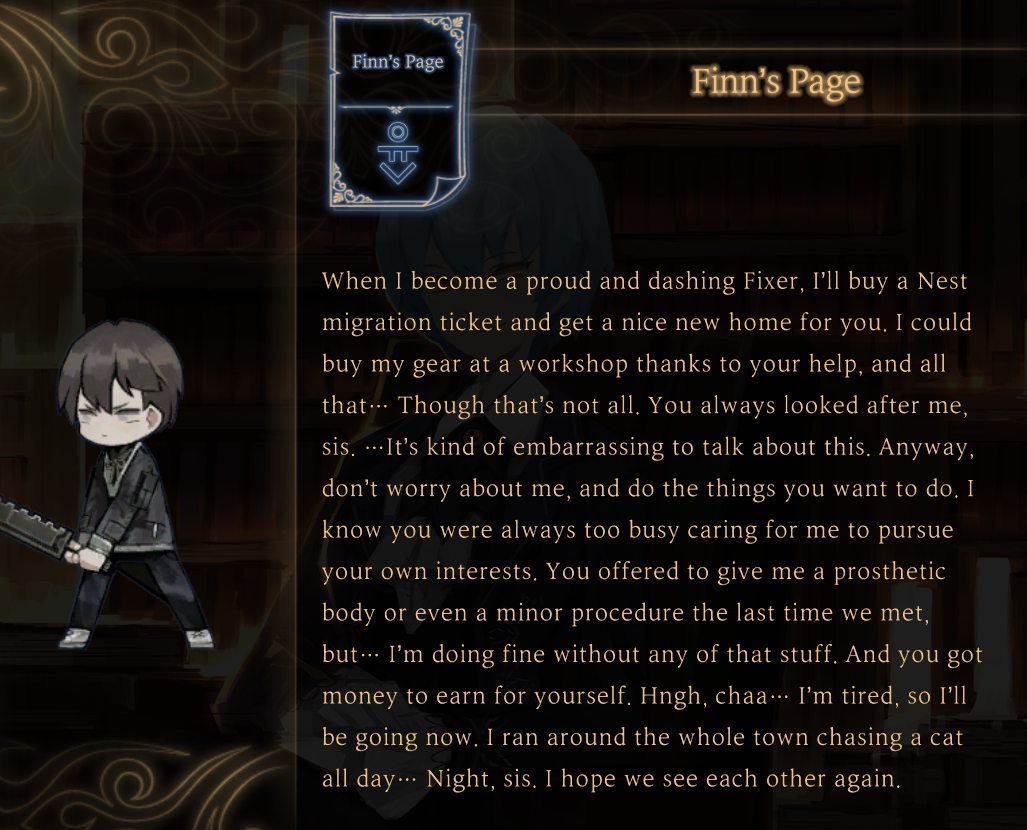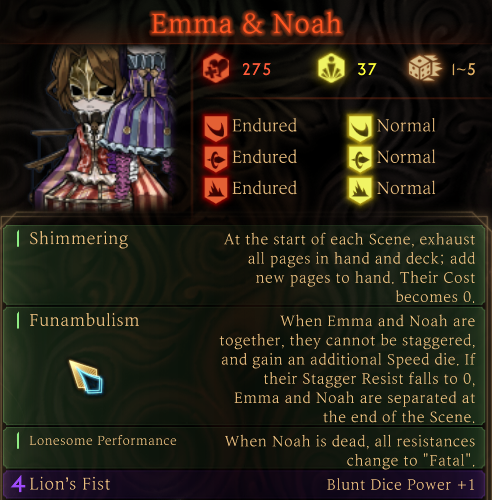Our Selves and Our Others
Library of Ruina is a deck-building strategy developed by the South Korean game company Project Moon. It follows the narrative of Angela, an AI who wishes to be human through collecting books, and Roland, a combatant who wanders into the Library and is forced into helping Angela achieve her wishes. The Library sends invitations to guests, who are given the choice to battle to either win whatever book they want or lose and become a book themselves. The game always gives an introduction to the guests by examining the events before they accept the invitation, demonstrating the ways in which people are coerced into accepting the invitation and meeting their ends. Although the Library kills most of its guests, Angela justifies her motives first by describing the comparatively more violent conditions of the City (the territory the game takes place in) and by affirming how the guests all had the freedom to refuse the invitation. Additionally, with how ruthless the people in the City are, it may be easy for some players to murder the guests, either because the guests themselves are evil or because the Library is not as brutal as others. However, as the game goes on, Angela becomes more aware of how hypocritical these lines of thinking are, as lots of the guests were forced into situations where they had to accept the invitation, and many of them had loved ones who they cared for or truly wanted to make the City a better place. I plan to examine a few of these guests to demonstrate the ways society, especially through capitalism, stunts people’s capacity to discover their desires and guides people away from developing morality.
Scholarly Conversation
Although there are few sources directly mentioning Library of Ruina, the game centers on free will and morality, both through the protagonists and through the guests themselves. Library of Ruina is heavily inspired by Nietzche’s philosophy of becoming our ‘true selves’ by fighting against the expectations placed upon you. The notions of free will also lend itself into discussions of determinism and fatalism, which are, respectively, the belief that everything is caused by some external force, and the belief that events in the future will inevitably occur. There’s also a lot of discussion around morality in the game, and there is, expectedly, so many papers about that topic in philosophical discourse, especially with how people’s definitions of morality clash with one another. I will focus more on how Library of Ruina’s setting discourages moral thinking, and then show how kindness helps us form communities and develop care for one another, ultimately a step towards breaking the cycles of violence.
Methods
I will use a literary analysis to uncover the characters’ beliefs through their dialogue and :thoughts, then introduce secondary sources to address the theoretical concepts I want to use to apply them to the examples in the game. I will also mix this with a game analysis using the combat itself, as the :battle styles of the characters reflect some of their personalities and beliefs and thus provide insight into the theories of free will and morality. Finally, I will try to mesh these two concepts together, to suggest a way in which people can be free to pursue their desires while allowing others to pursue their own freedoms.
Thesis
Project Moon shows characters who struggle with how their wants clash with or are restricted by the society they live in, or who revel in excess freedom that they destroy or ruin the lives of others. While rules and expectations keep people in place, they must also adapt to fit all individual desires. Ultimately, the only way for people to improve themselves is to follow their true desires while also grounding themselves in a place where they can harmonize with society.
Worldbuilding
My focus on individual characters who make relatively small changes reflects both Nietzche’s fatalism, yet also shows the ways people still have some control over the world around them, and that can push people towards understanding each other and building community. I want to acknowledge that individuals have a limited capacity to make big changes, yet through their small, collective actions, they can work towards building each other up. I also hope that, through analyses of academic concepts to videogames, I can show how much literary merit a game can have, despite conventional opinions about the superficiality of games, and also to encourage people to look towards indie game companies like :Project Moon as makers of worlds as well.

